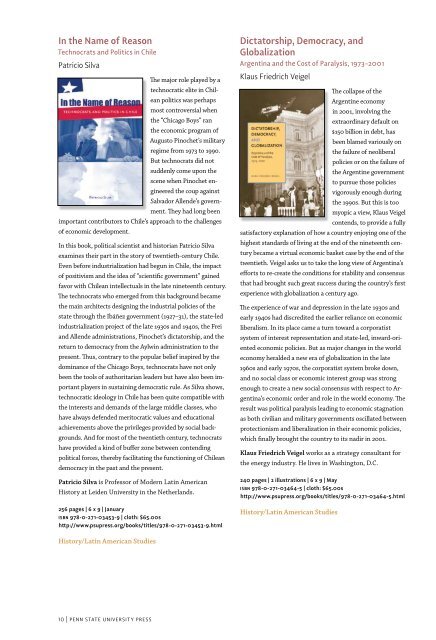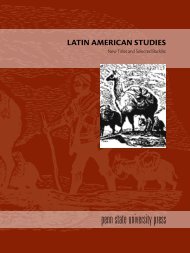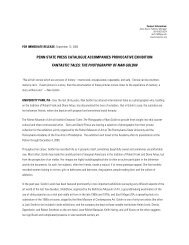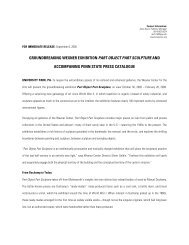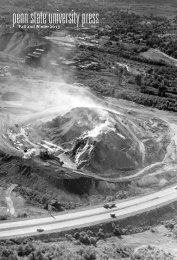penn state university press - Pennsylvania State University Press
penn state university press - Pennsylvania State University Press
penn state university press - Pennsylvania State University Press
Create successful ePaper yourself
Turn your PDF publications into a flip-book with our unique Google optimized e-Paper software.
In the Name of Reason<br />
Technocrats and Politics in Chile<br />
Patricio Silva<br />
The major role played by a<br />
technocratic elite in Chilean<br />
politics was perhaps<br />
most controversial when<br />
the “Chicago Boys” ran<br />
the economic program of<br />
Augusto Pinochet’s military<br />
regime from 1973 to 1990.<br />
But technocrats did not<br />
suddenly come upon the<br />
scene when Pinochet engineered<br />
the coup against<br />
Salvador Allende’s government.<br />
They had long been<br />
important contributors to Chile’s approach to the challenges<br />
of economic development.<br />
In this book, political scientist and historian Patricio Silva<br />
examines their part in the story of twentieth-century Chile.<br />
Even before industrialization had begun in Chile, the impact<br />
of positivism and the idea of “scientific government” gained<br />
favor with Chilean intellectuals in the late nineteenth century.<br />
The technocrats who emerged from this background became<br />
the main architects designing the industrial policies of the<br />
<strong>state</strong> through the Ibáñez government (1927–31), the <strong>state</strong>-led<br />
industrialization project of the late 1930s and 1940s, the Frei<br />
and Allende administrations, Pinochet’s dictatorship, and the<br />
return to democracy from the Aylwin administration to the<br />
present. Thus, contrary to the popular belief inspired by the<br />
dominance of the Chicago Boys, technocrats have not only<br />
been the tools of authoritarian leaders but have also been important<br />
players in sustaining democratic rule. As Silva shows,<br />
technocratic ideology in Chile has been quite compatible with<br />
the interests and demands of the large middle classes, who<br />
have always defended meritocratic values and educational<br />
achievements above the privileges provided by social backgrounds.<br />
And for most of the twentieth century, technocrats<br />
have provided a kind of buffer zone between contending<br />
political forces, thereby facilitating the functioning of Chilean<br />
democracy in the past and the present.<br />
Patricio Silva is Professor of Modern Latin American<br />
History at Leiden <strong>University</strong> in the Netherlands.<br />
256 pages | 6 x 9 | January<br />
isbn 978-0-271-03453-9 | cloth: $65.00s<br />
http://www.psu<strong>press</strong>.org/books/titles/978-0-271-03453-9.html<br />
Dictatorship, Democracy, and<br />
Globalization<br />
Argentina and the Cost of Paralysis, 1973–2001<br />
Klaus Friedrich Veigel<br />
The collapse of the<br />
Argentine economy<br />
in 2001, involving the<br />
extraordinary default on<br />
$150 billion in debt, has<br />
been blamed variously on<br />
the failure of neoliberal<br />
policies or on the failure of<br />
the Argentine government<br />
to pursue those policies<br />
vigorously enough during<br />
the 1990s. But this is too<br />
myopic a view, Klaus Veigel<br />
contends, to provide a fully<br />
satisfactory explanation of how a country enjoying one of the<br />
highest standards of living at the end of the nineteenth century<br />
became a virtual economic basket case by the end of the<br />
twentieth. Veigel asks us to take the long view of Argentina’s<br />
efforts to re-create the conditions for stability and consensus<br />
that had brought such great success during the country’s first<br />
experience with globalization a century ago.<br />
The experience of war and de<strong>press</strong>ion in the late 1930s and<br />
early 1940s had discredited the earlier reliance on economic<br />
liberalism. In its place came a turn toward a corporatist<br />
system of interest representation and <strong>state</strong>-led, inward-oriented<br />
economic policies. But as major changes in the world<br />
economy heralded a new era of globalization in the late<br />
1960s and early 1970s, the corporatist system broke down,<br />
and no social class or economic interest group was strong<br />
enough to create a new social consensus with respect to Argentina’s<br />
economic order and role in the world economy. The<br />
result was political paralysis leading to economic stagnation<br />
as both civilian and military governments oscillated between<br />
protectionism and liberalization in their economic policies,<br />
which finally brought the country to its nadir in 2001.<br />
Klaus Friedrich Veigel works as a strategy consultant for<br />
the energy industry. He lives in Washington, D.C.<br />
240 pages | 2 illustrations | 6 x 9 | May<br />
isbn 978-0-271-03464-5 | cloth: $65.00s<br />
http://www.psu<strong>press</strong>.org/books/titles/978-0-271-03464-5.html<br />
History/Latin American Studies<br />
History/Latin American Studies<br />
10 | <strong>penn</strong> <strong>state</strong> <strong>university</strong> <strong>press</strong>


